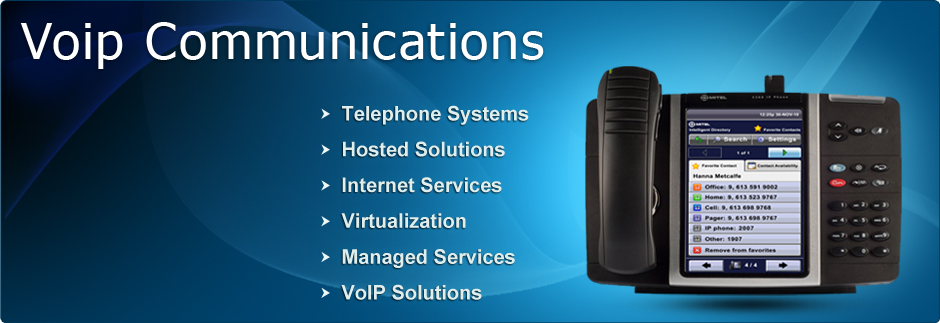Frequently Asked Questions About VOIP
Top 10 words you need to know about hosted phone systems
You don’t have to be an expert to set up a hosted phone service, it can be as simple as clicking a mouse and plugging in your phone.
But—hosted phone technology CAN seem daunting. Especially if you’ve only ever dealt with traditional phone systems.
So here are ten terms to help you better understand the world of hosted phone systems.
Hosted phone system. Let’s start with the obvious one. This is a service for which the calling platform and features are hosted at the service provider location—as opposed to in a server that resides in a closet at your office. With a hosted system, your employees connect to the system via “IP deskphones” (see below) that plug into the Internet. They can make calls to any traditional telephone. The benefit of a hosted system is that it’s simple to setup and manage because you don’t have to worry about equipment. It also saves you a lot of up-front money.
IP deskphone. This is a phone that makes and receives telephone calls over an “IP” network, such as the Internet. That’s instead of making calls over the traditional public switched telephone network (PSTN).
Voice over IP (VoIP). This is a methodology and group of technologies for the delivery of voice communications and multimedia sessions over Internet Protocol (IP) networks. Which is a complicated way of saying that your voice goes over the Internet, instead of over the phone lines.
Mobile softphone. This is an app that lets a smartphone make and receive calls over the business network, using the same phone number as your IP deskphone.
Flat, per-user monthly pricing. This is how most hosted phone systems are priced: with a single per user, per month rate that covers all aspects of the hosted phone service. (Excluding international calls and some other fees, of course.)
Web-based management tool. You manage your hosted system by logging in to an online control panel. Administrators can manage moves, adds and changes with just a few clicks. They can control all settings, including auto attendant menus, hunt group setup, and more. They can also administer multiple offices and remote users from anywhere.
Automated attendant. This service performs telephone console attendant functions such as answering a call, transferring callers to specific user stations, directing callers to voicemail, etc… all without the assistance of a live attendant
Hunt groups. This service rings multiple people at once to ensure no call goes unanswered. The system sequentially searches through the hunt group list to find an inactive line, and will then ring that line.
Follow Me. This feature automatically forwards calls to mobile phones and other numbers, or rings multiple numbers at the same time.
Voicemail-to-email and fax-to-email. This feature ensures messages get through faster. Users can save, delete and forward voicemail messages and faxes just like with any email.
What is Cloud PBX?
In the past, most phone systems required buying hardware and paying someone to install and maintain it. With Cloud PBX, your phone service is delivered from our data-centers. All you have to do is buy the phones and connect them to the Internet.
If you're new to the world of cloud phones, here are the top 10 definitions you will need to know.
And here are the answers to a few common questions:
What is Cloud PBX?
Our VoIP systems offers VoIP-enabled business telephone service for your business—without requiring you to install and manage complicated, expensive equipment.
What is VoIP?
VoIP is the acronym for Voice over Internet Protocol. It is the general term used to describe the technology of transmitting and delivering voice communications over the Internet.
Do I have to deploy Cloud PBX to every Exchange user?
No. Cloud PBX can be enabled for as few as one user. It can also be enabled for Active Directory users who don’t have Exchange mailboxes.
Can I get Cloud PBX service as a standalone product?
Yes. Cloud PBX can either be added to your hosted Exchange service from us, or you can add Cloud PBX service as a standalone product.
Where are Cloud PBX services offered?
Our Cloud PBX service is available in all 50 United States (Alaska and Hawaii included at no additional cost).
Can I park unused phone numbers on a Cloud PBX service?
Yes, parking unused phone numbers is possible though a small per-number fee is charged.
Are toll-free numbers available?
Yes. With Cloud PBX service from us, you can order new toll-free numbers or port existing toll-free numbers.
Reliability
Moving to the cloud improves the reliability of your voice system. That's because your VoIP service stays running even if your local lines are knocked out by a storm or a power outage. What's more, Intermedia guarantees 99.999% uptime.
Cloud voice service should be a key element of your business continuity strategy. The failover solutions provided by a VoIP service help keep your business up and running even when you have to move workers to an alternative site or have them work from home.
Learn more about how a cloud voice service like Cloud PBX can help you protect your business from unexpected downtime.




